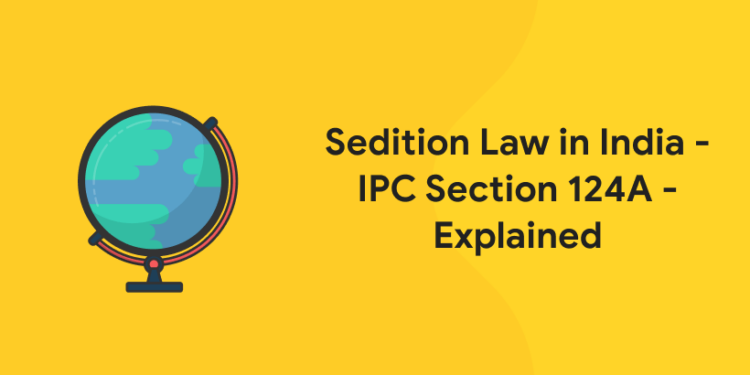Table of Contents
Section 124A of the Indian Penal Code formulated the punishment for sedition. The Indian Penal Code was sanctioned in 1860, under the British Raj. Section 124A forms part of Chapter VI of the Code which deals with crimes against the state. Chapter VI consists of sections from 121 to 130, wherein section 121A and 124A were launched in 1870. The then British government in India worried that Muslim preachers on the Indian subcontinent would call for a war against the government. Especially after the successful abolishment of Wahabi/Waliullah Movement by the British, the requirement was felt for such law.

Attempt Free GK Test! Download Entri App!
The section kept bringing criticism in the independent India too for being a restriction to the right to free speech. Sedition was made a perceptible crime for the first time in history in India through the government of Prime Minister Indira Gandhi in 1973, which means, arrest without a warrant was then allowed. In 1962 the Supreme Court of India transcribed the section to apply only if there is, say, “incitement to violence” or “overthrowing a democratically elected government through violent means”.
As of 11th May 2022 this law has been put on short term hold by Supreme Court of India quoting re-examination.
The Supreme Court Wednesday asked the Centre and states to keep in suspension with all pending trials, appeals, and proceedings with respect to the charge framed under Section 124A of the Indian Penal Code (IPC), which deals with the crime of sedition, till the central government finishes the promised exercise to re-examine and revise the provision.
At first the central government had protected the colonial provision, but later told the apex court it was assessing it.
Attempt Free GK Test! Download Entri App!
What is the sedition law?
Section 124A defines sedition as: “Whoever, by words, either spoken or written, or by signs, or by visible representation, or otherwise, brings or attempts to bring into hatred or contempt, or excites or attempts to excite disaffection towards, the Government established by law shall be punished with imprisonment for life, to which fine may be added…”
The provision also has three explanations:
1- The expression “disaffection” includes disloyalty and all feelings of enmity;
2- Comments expressing disapprobation of the measures of the Government with a view to obtain their alteration by lawful means, without exciting or attempting to excite hatred, contempt or disaffection, do not constitute an offence under this section;
3- Comments expressing disapprobation of the administrative or other action of the Government without exciting or attempting to excite hatred, contempt or disaffection, do not constitute an offence under this section.
Grab Latest Study Materials! Register Here!
What are the origins of the sedition law?
1: Who was the first woman President of India?
Although Thomas Macaulay, who introduced the Indian Penal Code, had included the law on sedition, it was not attached in the code sanctioned in 1860. Legal experts believe this deletion was unexpected. In 1890, sedition was included as an crime under section 124A IPC through the Special Act XVII.
In 1955, the punishment imposed then, transportation “beyond the seas for the term of his or her natural life”, was reformed to life imprisonment.
The provision was widely used to restrain political disagreement in the time of the Independence movement. Many pre-independence cases requiring Section 124A of the IPC are in opposition to celebrated freedom fighters, like Bal Gangadhar Tilak, Annie Besant, Shaukat and Mohammad Ali, Maulana Azad and Mahatma Gandhi. It is through this time that the most famous trial on sedition — Queen Empress v. Bal Gangadhar Tilak — took place in 1898.
In general, Courts followed a literal interpretation of the provision holding that “… the disapprobation must be ‘compatible’ with a disposition to offer obedience to the lawful authority of the Government and to support the lawful authority of the Government against unlawful try to bring down or resist that authority.”
The Constituent Assembly had discussed about including sedition as an exception to the fundamental right to freedom of speech and expression, guaranteed in the Constitution, but many members hysterically conflicted and the word is not contained in the document.
Grab Latest Study Materials! Register Here!
Legal challenges to IPC Section 124A
As early as 1950, the Supreme Court in Romesh Thapar v State of Madras held that “criticism of the government appealing dislike or bad feelings towards it, is not to be considered as a favorable ground for regulating the freedom of expression and of the press, but it is such as to threaten the security or tend to overthrow the state.” Justice Patanjali Shastri quoted the Constituent Assembly’s intentional deletion of the word sedition from the Constitution for the liberal reading of the law.
Eventually, two high courts — the Punjab and Haryana High Court in Tara Singh Gopi Chand v. The State (1951), and the Allahabad High Court in Ram Nandan v. State of Uttar Pradesh (1959) — announced that Section 124A of the IPC was majorly a tool for colonial masters to put an end to disagreement in the country and declared the provision unconstitutional.
Attempt Free GK Test! Download Entri App!
Anyway the issue arised before the Supreme Court in Kedarnath Singh v State of Bihar in 1962.
Grab Latest Study Materials! Register Here!
The Kedar Nath ruling on sedition
A five-judge Constitution Bench withdrew the earlier rulings of the high courts and sustained the constitutional validity of IPC Section 124A. However, the court aimed to limit its scope for misuse. The court held that unless accompanied by a provocation or call for violence, criticism of the government cannot be called sedition. The ruling limited sedition only insofar as seditious speech secured to provoke “public disorder”- a phrase Section 124A itself does not contain but was read into it by the court.
The court also published seven “guidelines”, underlining when critical speech cannot be certified as sedition.
In its guidelines on using the new, restrictive definition of sedition law, the court said not all speech with “disaffection”, “hatred,” or “contempt” against the state, but only speech that is likely to provoke “public disorder” will be eligible to be considered as sedition.
After the Kedar Nath judgement, “public disorder” has been regarded as an obligatory component for the commission of sedition. The court has held that mere sloganeering without any threat to public order would not be considered as sedition.
Grab Latest Study Materials! Register Here!
This ruling in Balwant Singh v. State of Punjab (1995), repeated that the real purpose of the speech must be taken into account before naming it seditious. The petitioners were arrested of sedition for raising slogans of “Khalistan Zindabad, Raj Karega Khalsa, Hinduan Nun Punjab Chon Kadh Ke Chhadange, Hun Mauka Aya Hai Raj Kayam Kar” (Hindus will leave Punjab and we will rule) etc. in a public area.
In further rulings — Dr. Vinayak Binayak Sen v. State of Chhattisgarh (2011), — the court also held that a person will be accusable for sedition even if she is not the writer of the seditious speech but has simply spread it.
In 2016, in Arun Jaitley v State of Uttar Pradesh, the Allahabad High Court held that criticism of the judiciary or a court ruling — previous Union minister Arun Jaitley in a blog post had denounced the Supreme Court’s 2016 ruling announcing the National Judicial Appointments Commission unconstitutional — would not be considered as sedition.
Sequential reports of the Law Commission of India and even the Supreme Court, have highlighted the widespread misuse of the sedition law. The Kedar Nath guidelines and a textual deviation in law puts the burden on the police who register a case to differentiate between legitimate speech from seditious speech.
Previous year, in Vinod Dua v Union of India, the Supreme Court cancelled FIRs with charges of sedition against the journalist for blaming Prime Minister Narendra Modi’s treatment of the Covid-19 crisis and warned against criminal implementation of the provision.
Grab Latest Study Materials! Register Here!
What is the fresh challenge to sedition law?
The Supreme Court has admitted to hear a fresh challenge against the provision after a batch of complaints were filed by journalists, Kishorechandra Wangkhemcha, Kanhaiya Lal Shukla; and Trinamool Congress MP Mahua Moitra, among others. This would require a seven-judge bench taking into cosideration if the Kedar Nath ruling was correctly determined.
Although the government at first supported the provision claiming that “isolated incidents of misuse” do not involve deletion of the provision itself, it has now told the court that it is considering a fresh review of the colonial law.
The petitioners have claimed that the restricted Kedar Nath definition of sedition can be conveyed through many other laws, along with stringent anti-terror laws such as the Unlawful Activities Prevention Act.
The court’s intervention is critical because in case it attacks the provision, it will have to cancel the Kedar Nath ruling and support the earlier rulings that were liberal on free speech. Eventhough, if the government plans to evaluate the law, either by weakening the language or repealing it, it could still bring back the provision in another form.
Grab Latest Study Materials! Register Here!
Sedition laws in other countries
In the United Kingdom, the sedition law was formally revoked under Section 73 of the Coroners and Justice Act, 2009, quoting a terrifying effect on freedom of speech and expression. The common law on sedition, which is discovered to the Statute of Westminster, 1275, when the King was regarded the holder of Divine right, was termed “arcane” and “from a bygone era when freedom of expression wasn’t seen as the right it is today.”
In the United States, sedition is a federal felony under the Federal Criminal Code, Section 2384, and is now being used against rebels involved in the January 6 attack on the Capitol. In spite of the First Amendment that prohibits any restrictions on free speech, “conspiracy to interfere directly with the operation of the government” and not just speech is regarded as sedition.
Australia cancelled its sedition law in 2010, and last year, Singapore also cancelled the law quoting that many new legislations can adequately address the real need for sedition law without its terrifying effects.
Grab Latest Study Materials! Register Here!
I hope this article was helpful. The key point to clear an exam lies in methodical and planned preparation. If you are a candidate who wants to pursue your dream career and looking for a good start, our Entri app has got it covered for you. Our team will help you with content and insights related to the topics of your concern. Subscribe to our app today and enrol yourself into various programmes our app offers. Tune in to the app to stay updated regarding various aspects of the subject you are interested in. Feel free to post any queries and doubts in the comment section. We will try our best to reach out. Push away all those self-doubts and negative thoughts. Try to have a clear vision. Ask yourself why you want this. Focus on the good and work hard.












